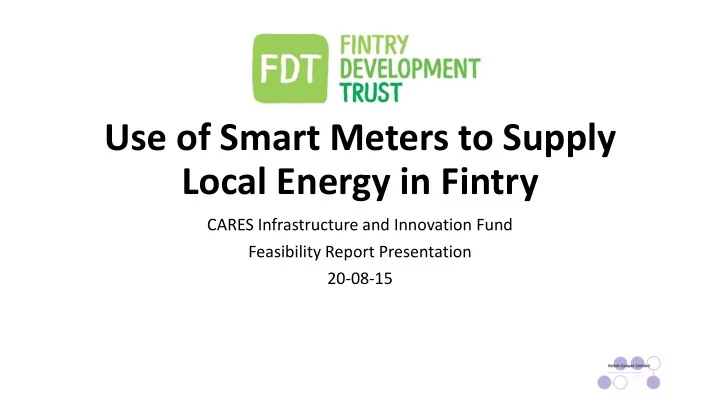

Use of Smart Meters to Supply Local Energy in Fintry CARES Infrastructure and Innovation Fund Feasibility Report Presentation 20-08-15
Introduction • Veitch Cooper Ltd • Renewable Energy Infrastructure and Technology Developer • Independent Consultancy established 2014 • Framework adviser for Local Energy Scotland CARES projects • Sandy Wito • Associate with Veitch Cooper consortium • Independent consultant with Wito Energy • 22 years experience in Energy Industry
Background Fintry Strathendrick AD Plant • 335 households, 700 Residents • 1.1 MWe export independent AD plant • Ambition to become more sustainable and • Uses local silage and distillery waste to use local resources produce methane • Engaged in local energy projects and energy • Exports electricity and produces fertiliser and saving animal bedding • Residents with oil/lpg heating and fuel • Potential for expansion and use of exhaust poverty problems heat
Initial Idea New Direct Connection • Idea to directly connect AD plant to the village and bypass grid • Technically possible but difficult in practice • Expense of new line construction, planning consent and wayleaves • Adoption of local network and provision of back-up power • Requirement for agreement from every household and regulatory protection for consumers
Alternative Proposal • Direct connection not achievable so create ‘virtual’ connection • Install ‘Smart Meters’ to measure and record resident’s consumption • Combine with network management and generator control to create local ‘smart grid’ • Match consumption and generation through time to create link
Feasibility of Proposal • Three areas of feasibility to examine : Technical Economic Regulatory
Technical Feasibility • Smart Meters • Smart meters compulsory by 2020 – to be funded by electricity suppliers • Offer remote reading and recording of energy use through time • Residents get in-home display to provide information on usage and cost • Meters available that offer control of appliances and sockets • Active Network Management • Control software that aims to ensure grid constraints not breached • Controls generation to avoid local surplus and/or load to avoid local deficit • Lower cost than physical expansion of distribution network • Similar Projects already in operation or development: • Shetland and Orkney smart grids • LECF funded ACCESS project on Mull, ARC project in Scottish Borders
Regulatory Feasibility • Current market designed to promote competition and reduced costs • Restrictions on suppliers offering tariffs on a discriminatory basis • Network operators able to recover all costs, little incentive to take risks or innovate • Ofgem recognising that market needs to change and evolve with technology
Economic Feasibility • Costs • Benefits • £500 per home for smart meter • £70 per household saving in electricity from smart meter each year • £6k per home for ASHP • £5-600 saving in heating costs by • £150k for ANM software converting to heat pump • Total: £1.9m for entire village • £1.3m total RHI benefit • Total:£3.3m for entire village • Potential benefit to Strathendrick AD in increased revenue and output • Benefits to SSE and its customers from £4-700k avoided grid expansion costs • 1000t CO 2 saving p.a. allocated to village
Conclusions • Technology exists and is proven Technical • Regulatory barriers can be overcome • Project brings potential economic benefits to: • Fintry Residents Economic Regulatory • Strathendrick AD plant • SSE network and customers • Lower risk and smoother implementation with additional funding and support
Next Steps • CARES IIF funded Feasibility report delivered • CARES Local Energy Challenge Fund awarded July 2015, £25k granted • SSE engaged as Distribution Network Operator • Veitch Cooper in discussions with other partners: • Bulb Energy as Independent Supplier offering settlement and billing services • Energy Assets/vCharge as Smart Meter and network control software supplier • Community engagement by FDT key to getting residents on board • Next stage LECF application to be submitted by February 2016 • Provides for £1-6m of funding for implementation
Recommend
More recommend